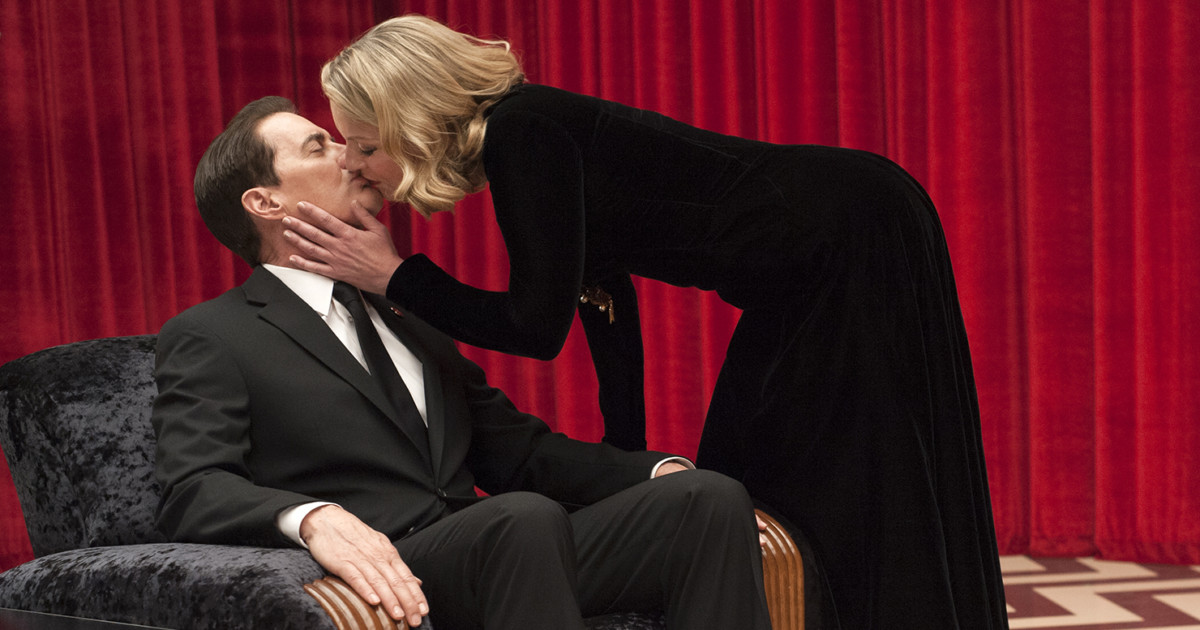
Twin Peaks: The Return - Episodes 1 & 2
Slead Score: A-
"I'll see you again in 25 years." - Laura Palmer.
Just like the prom queen who washed ashore promised, Twin Peaks has, indeed, returned. David Lynch's intellectual cherry pie of a soap opera has earned its place in pop culture history with no remorse, arguably creating the concept of "cinematic television" since its premiere over 25 years ago. Without Special Agent Cooper chasing down the ruthless killer of the beautiful Laura Palmer, who knows how many boundaries would have been pushed in storytelling to this day. Of course, the series that is adored, studied, replicated, ridiculed, and rehashed can't return to modern television without calculating its plan of attack on eager fans and knife-wielding skeptics. So, with the pressure of a prodigal son, Lynch's heady tale of the town of Twin Peaks has manifested itself just in time to fulfill Laura's promise. This alarming, yet perfectly executed "return" is exactly what Lynch would throw on screen after years away from the network spotlight; a commentary on where television is now and how society handles its consumption of it. All of this wrapped into what our beloved town looks like after two decades of time out of sight.
Much like the two-hour premiere handles its scattered narrative, it's only fair to address its strengths and weaknesses piece by piece. First and foremost, the at times tongue-in-cheek tone Twin Peaks is known to display is rarely seen in this introduction. In fact, the first moments of the episode make that clear, as the Black Lodge is just like we left it so long ago, with Laura reminding us all she hasn't forgotten there is more to tell. Cherry pie, coffee drinking, and checking pots for dead fish are distant memories for everyone in town, especially Dale Cooper, who was bloody-faced and seemingly possessed by none other than Laura's ghoulish killer when we last left him. The first sight of a long-haired and disheveled Cooper prompts nothing more than a feeling of dread, as it's clear Bob is alive and well, using the man we all grew to love so many years ago. In turn, that leaves the real Dale Cooper trapped in the red velvet-curtained room, setting in motion the idea that this jovial sleuth has been waiting for a chance to escape. Suddenly, the iconic visual of the cozy red walls and the striking zig-zag floor feels like Lynch's representation of purgatory, where everything, down to language, ceases to flow in normal time. This tone of long-endured pain and long-awaited salvation is cast across the entire two-hour run, and as heartbreaking as it feels, it fits perfectly with what Twin Peaks has always been at its core.
When we first met Laura she was a silent signal for danger, wrapped in plastic. It was over two seasons and a prequel film that we were able to fully comprehend the tragedy and otherworldly anguish Laura endured; as if death wasn't enough. Unsurprisingly, Lynch has captured this feeling by putting it onto Cooper now, but instead of wrapping him in plastic, he's placed Cooper neatly into the red room, while his living body, inhabited by Bob, roams around performing years of deadly deeds. The brief glimpses we do get of the once quaint and loving town feel distant and cold, as if all manner of emotion has been wiped away. The signature red and blue-lensed glasses wearing Dr. Jacoby has been replaced with a simple, quiet man living in a cabin in the woods, while One-Eyed Jack owner and woman user Ben Horne has taken on the mantra to respect all women. Everything has been wrapped in its own plastic. Instead of "who killed Laura Palmer?' we're left with "who killed Twin Peaks?" as the inciting mystery, and much like the original series run, it will take its damn time to give us an answer. Most scenes maintain Lynch's slow-moving pace, giving us plenty of time to take in every shot and feel the heart missing from the once dramatic-filled town. All of our beginning drama and action is found behind the curtain, in the unexplainable, and at times frustrating, side of Twin Peaks, where Lynch plays with surrealism and avant-garde imagery. Of course, there are hints at a straightforward storyline emerging from the fog, such as Matthew Lillard's incarceration for the murder of his school's librarian.
Apart from the town and its spiritual side, we jump to New York City as a setting for what can only be hypothesized as Lynch's speech on television today. It would be criminal to avoid the meta-commentary available within the two-part premiere, especially when it comes to the current landscape of how television is consumed. We see a young man sitting in a giant loft in the city, staring at a glass box, which has a hole that goes outside of the building's wall. We slowly learn this man's job is to watch the box in the chance something appears in it, and apart from air, for awhile it seems like nothing is happening. When his soon-to-be lover joins him to watch the box, we get a brief back-and-forth, followed by a hardcore love scene that seems to have greater meaning. In a world that is ready to binge a series of a show as soon as it hits the streaming platforms, these two people represent possibly the fans and/or skeptics of Lynch's return, staring at this TV-like box, waiting for something to happen. As soon as they've given up hope for something to happen, they decide to move on to their next indulgence. Gone are the days of weekly storytelling that rely on a mutual discussion to decode, in favor of another series churning out its narrative through a hashtag to gain a Buzzfeed article. Twin Peaks is slow, very slow, and Lynch is dialing this return back more than usual to arguably drive home what it feels like for a slow-burn storyteller to create in the modern era. Of course, as with all Lynch does, this segment isn't just a chance to put a lens on meta-commentary, as a mysterious glowing figure emerges from the box to brutally attack the lovers. It's as if Lynch is reminding us what we're going to see in the coming season will attack our senses and challenge us to the point of exhaustion.
This feeling permeates the final Black Lodge scenes as well, as Cooper slowly shuffles from room to room looking for a way out. A talking tree informs him the doppelganger will end him, and once again, we're brought back to the "twin" in Twin Peaks. Duality is a theme that seems to never leave anything relating to the town, and that includes the spiritual side Cooper is trapped in. For now, we don't know if or how he will escape, but while Cooper-Bob takes more victims in the real world, the real Cooper is transported to that same glass box to be stretched, resized, and examined by an unseen force. His warping experience feels like an additional commentary on how Dale Cooper, and Twin Peaks overall, will be received by us, the TV watchers, 25 years from when we first met them. Thankfully, the only direction this can go is up, as we see Cooper-Bob realizes his hold on reality is slipping, meaning good Cooper is just on the edge of his return.
While parts one and two may not deliver the heart-warming return to Twin Peaks many were expecting or hoping for, it does, thank goodness, stay true to where we last saw the town and what we know the core of the show to be. The reason Twin Peaks became an icon in television is because it took us to places we had never been before. It pulled back our white-picket fenced layers of Americana to show the seedy underbelly we so desperately want to avoid. Now, Lynch has returned to television in a time where a girl washed up on shore isn't shocking, and the people who killed her are successfully gallivanting as heroes. So yes, this premiere is weird, shocking, indulgent, slow, and perplexing, but it's already challenging what has attempted to usurp its throne since its original run. Lynch has made it clear we're going on a ride we won't expect, so please pass the pie, cause that's just what we need.

